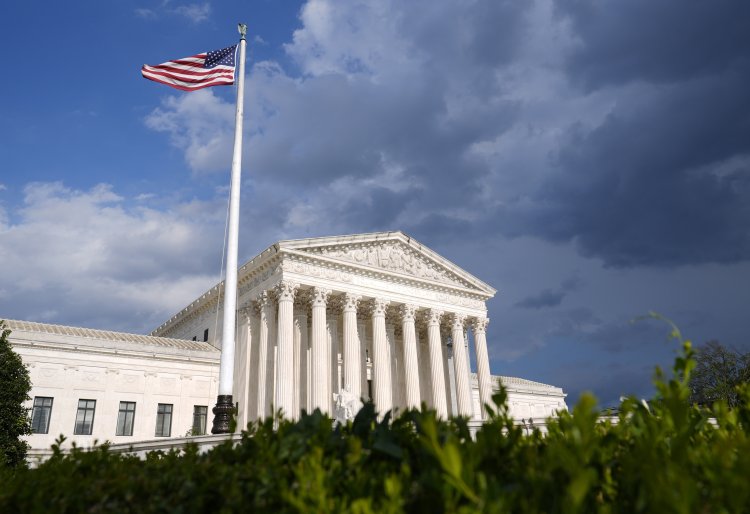The small-scale law firm fully committed to Trump
Unlike other law firms that attract the president's criticism, joining Boyden Gray has evolved into "the Supreme Court clerkship of the new-right."

While numerous major law firms grapple with the appropriate reaction to Trump’s executive orders that suspend security clearances, halt government contracts, and restrict access to government buildings, the conservative boutique firm is experiencing a surge in success.
In the past four years, this 15-person firm has positioned itself as one of the most prominent legal entities championing conservative policy initiatives central to Trump's second tenure. During President Joe Biden’s administration, the firm initiated several legal actions addressing corporate diversity, equity, and inclusion policies, environmental regulations, and pandemic-related vaccine mandates, among other issues. With Trump now back in power, several current and former attorneys from the firm have secured various roles within the administration.
“They are really engineering cases that are moving our jurisprudence forward,” stated Dan Epstein, vice president of America First Legal, an organization aligned with Trump and founded by Stephen Miller, which has collaborated with the firm on multiple lawsuits. “When you need to push a strategy, when you want to challenge a regulation, when you want to challenge not just the regulation but the regulatory infrastructure, there's no one else to call.”
The firm’s younger attorneys—none over the age of 45 and many with experience from the prior Trump administration—are managing a diverse range of cases, representing clients that include Target shareholders and a prominent fracking company established by the energy secretary. Additionally, Boyden Gray is advocating for the Heritage Foundation in a lawsuit that contests Biden-era workplace protections for transgender individuals and has filed amicus briefs supporting Republican lawmakers on matters such as birthright citizenship.
Boyden Gray’s ascendance during the Trump era coincides with the president targeting other firms through executive orders, threatening to undermine their businesses if they retain attorneys who have investigated him or engage in cases viewed as contrary to his interests. While some firms have countered Trump’s orders in court, others have reached agreements with the president, creating a complex dynamic. “What this involves is misusing the full weight of government power to engage in personal retribution and to chill protected First Amendment opportunity, which includes litigating against the government,” remarked Peter Keisler, a former Justice Department official under President George W. Bush.
In contrast, attorneys at Boyden Gray express no concern over the president’s recent executive actions, despite establishment conservative lawyers labeling them as assaults on the rule of law. “I think part of what the EOs were designed to do was to bust that informal cartel mindset that a lot of the big D.C. firms had,” said firm partner Trent McCotter in an interview. He elaborated, “You have the security clearance part, which is absolute core executive prerogative. You have the government contracting part, which is something that presidents have used for a long time to try to achieve goals, policy goals, to try to effect change, to try to encourage government contractors to change their behavior.”
Meanwhile, law firms that have challenged the Trump administration regarding the executive orders suggest that these orders create a chilling effect, aimed to intimidate firms away from taking cases that oppose the administration’s interests. Other large firms that have made deals with the administration have pledged pro bono hours to support causes aligned with it, resembling some of the work already carried out by Boyden Gray.
Founded nearly 15 years ago by C. Boyden Gray, a former White House counsel under George H.W. Bush and a steadfast Republican, the firm originally operated as an extension of Gray’s personal office. Initially named Boyden Gray & Associates, it focused on lobbying and policy advice before shifting to a more litigious approach in 2020. The firm was renamed after Gray’s passing in 2023.
By the close of the first Trump administration, the federal judiciary had become conducive to the kinds of lawsuits in which Boyden Gray was engaged. The record-setting number of judicial appointments made by Trump created favorable circumstances for lawsuits aimed at overturning federal agency rules and regulations that conservatives opposed, as well as challenging the implementation of DEI policies across both public and private sectors.
“It became clear that if you want to advance your goals … you have to be willing to sue,” McCotter observed. “You kind of have to be dumb not to decide that at the very least a major tool in your arsenal is litigation.”
This litigation strategy has proven effective, although the slow-moving nature of civil litigation means many of the firm’s cases remain entangled in appeals. In December, the firm secured a ruling from the 5th Circuit Court of Appeals that struck down a SEC-approved rule requiring companies listed on the Nasdaq to disclose demographic information about their directors or explain why they did not meet diversity criteria.
Last month, McCotter presented arguments before the Supreme Court to revive the nondelegation doctrine, a legal framework that would prevent Congress from transferring its powers to executive branch agencies. A successful outcome could represent a significant setback for agency authority in recent history.
Others within the emerging conservative movement concur that Boyden Gray’s legal efforts are essential for furthering policy objectives beyond the Trump years. “The next generation of Republican leaders are folks like Marco Rubio and JD Vance and Josh Hawley and Jim Banks,” noted Oren Cass, founder of the new-right think tank American Compass. “In that world, Boyden Gray really stands alone as the firm that is at the cutting edge of actually developing the legal strategy to accompany that political push and those policy priorities.”
Despite its modest scale, Boyden Gray has recently seen three of its current members nominated or appointed to various roles within the executive branch. This includes managing partner Jonathan Berry, nominated for the leading legal position at the Department of Labor, Wells King—who now serves on the White House Domestic Policy Council—and Adam Chan, who is now national security counsel at the FCC.
“The role that an institution plays as a talent pipeline is also critical,” Cass remarked. “And I think Boyden Gray … has really established itself as the place for young legal talent to go if they themselves want to then become leaders in this movement.” He added, “Being the guy at Boyden Gray is kinda like the Supreme Court clerkship of the new right. That is an extremely important service to provide.”
Former members of the firm are also making their marks within the administration: Caleb Orr is now acting assistant secretary of state for economic and business affairs, Adam Gustafson is the acting assistant attorney general for the environmental and natural resources division, and T. Elliot Gaiser is nominated as assistant attorney general for the office of legal counsel.
As the remainder of the Trump administration unfolds, McCotter indicated that the firm will persist in seeking opportunities to bolster the administration’s legal framework. “Look over the last four years and see, what did more liberal groups do to support the Biden administration?” he stated. “And that’s going to be a blueprint for conservative groups, our law firm, for what we should be doing for the next four years.”
Allen M Lee for TROIB News
Find more stories on Business, Economy and Finance in TROIB business












